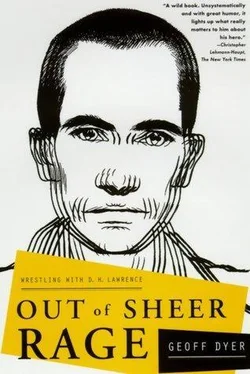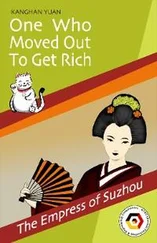A few weeks earlier, to use up the last frames of her film, Laura took some pictures of me after I had finished playing tennis. My back was aching, I was dehydrated — we had drunk too much red wine the night before — but I was surprised, when the pictures came back from the lab, by just how terrible I looked. Something of that weariness made me look like my father as he does now, in his seventies. For the first time I saw my father in a picture of myself.
The reciprocal relation of these photos — mirror-images, reflecting each other back across a generational divide of almost forty years — is not accidental. It is a visual preparation for my father’s inevitable death: there will come a time when it is only my genes that will continue the work of the camera in preserving his likeness. Looking at that picture of my father in his tennis whites, I realised how that skill, that instinctive ability to hit a ball in motion, to get the hang of sports, is still there, in my hands, in my arms.
They gave me pause, those photos, made me wonder what other traits I had inherited. One night I was woken by the sound of the people next door getting back late, by the key scraping in their lock. Lying in bed, suddenly awake, I realised that another part of my character could now be firmly identified as a permanent trait. I have always woken up easily but it is only now that I can collate the evidence of the years into the simple verdict: I am a light sleeper. Like my father. When I lived at home the slightest noise was always enough to rouse him. Light sleeping, for him, was always a kind of domestic vigilance, a way of being alert to any possible intrusion into his home and family: a way of looking after my mother and me. A light sleeper himself, he took great pains to avoid waking the rest of us when he got up in the semidarkness to go to work; like him I open doors quietly and walk lightly across rooms.
These habits were acquired as if by accident; others, like paying debts promptly, scrupulously, were conscientiously instilled. It may be of no interest to anyone — and this entire book, I suspect, is of no interest to anyone — but it so happens that I am very good at paying my debts. You can tell, just by looking at me. I have an honest face, apparently. Grocers never refuse when I ask if I can owe them for milk or vegetables and quite often they tell me it is because I have an honest face. It is one of the things grocers pride themselves on, judging character by appearance. If they have the knack for picking out the best vegetables at markets then they can pick out customers who can owe them money for their under-ripe melons and rotten apples. Shopkeepers were happy to extend Lawrence credit, I imagine, since he was always scrupulous about paying his debts. Maybe this shared quality is why I like reading what are ostensibly his dullest letters, the ones in which he settles accounts, reckons up what he owes. ‘I owe you some money,’ he wrote to Bertrand Russell. ‘We got those frescoes for 3 guineas. That is, your share, 31/6. Therefore I owe you 8/6. I will send it you, I won’t forget.’ I love that ‘I won’t forget’, and I love it when he urged Barbara Low to ‘remind Frieda that she pays you for the cake etc. I shall be so angry with her if she forgets it, as she is too likely to’. Three weeks later he wrote again: ‘Of course Frieda never paid you for the cake and sweets so I send on here the 10/-.’
The corollary of this scrupulousness was, needless to say, a tendency towards niggardliness. He complains that his sister Emily ‘can’t help feeling that ninepence is exactly half as good again as sixpence. If I wearily protest that ninepence is nothing to me unless it’s ninepence worth of life, she just looks at me as if I’d said nothing. How I hate the attitude of ordinary people to life. How I loathe ordinariness! How from my soul I abhor nice simple people, with eternal price lists.’ That’s as may be but she can hardly have been more obsessed with prices than her brother. Some of his best letters are nothing but price lists. Others are long, itemised whinges about how much things are costing, how he is being overcharged, how the exchange rate is working to his disadvantage (especially in Italy), how he has to pay duty on books sent through the post, how he is being cheated by government officials, shopkeepers, hoteliers and porters. As a travel book Sea and Sardinia is way ahead of its time: it anticipates the era of mass tourism when the chief conviction of all English holiday-makers is that they are being fleeced at every turn, when the strongest memory of the Sistine Chapel will be the stunning price of the choc-ices on sale outside. Lawrence is in a strop about money for the duration of his Sardinia trip but at one point his irritation erupts in molten anger.
I am thoroughly sick to death of the sound of liras. No man can overhear ten words of Italian today without two thousand or two million or ten or twenty or two liras flying like venomous mosquitoes round his ears. Liras — liras — liras — nothing else. Romantic, poetic, cypress-and-orange-tree Italy is gone. Remains an Italy smothered in the filthy smother of innumerable lira notes: ragged, unsavoury paper money so thick upon the air that one breathes it in like some greasy fog. Behind this greasy fog some people may still see the Italian sun. I find it hard work.
He found it hard work, too, to keep in temper with the various publishers and agents he felt were not treating him honestly (‘Does the return railway fare from New York cost as much as $300?’ he queried Robert Mountsier. ‘You remember you said you would let me pay the railway fare only’). Again and again Lawrence insists that what he wants is to be frank, fair and ‘precise’ in his dealings. ‘I don’t want anything that doesn’t seem to you just and fair,’ he wrote to Martin Secker at the start of their business relationship. ‘But I want you also to treat me justly and fairly’ — something which Lawrence felt happened all too rarely.
Perhaps we should not make too much of Lawrence and money. He was, after all, a genuinely freelance writer in that he lived entirely by his pen (and the odd loan) and freelance writers are notoriously obsessed with money. I am, at any rate. When Flaubert — who, unlike Lawrence (and me), had a modest private income to live off — declared ‘everybody is hard up, starting with me!’ he was not only lamenting his lot, he was also striking the authentic note of literary single-mindedness. Read most writers’ letters and book-writing appears to take a subordinate place to book-keeping. Because at various times he tried to do without an agent and opted, eventually, for self-publishing, it is not surprising that an exceptional amount of the seven volumes of letters comprises Lawrence’s financial wrangles. What is surprising is to find that the parts of the correspondence of a great writer I most like are those which would be edited out if any kind of selection were made, i.e. those having nothing to do with his genius and everything to do with his ordinariness, with the ordinariness he claimed to loathe. The fact that Lawrence wrote Lady Chatterley’s Lover means next to nothing to me; what matters is that he paid his way, settled his debts, made nice jam and marmalade, and put up shelves.
All of this is irrelevant — if something can be deemed irrelevant in a book comprised entirely of irrelevancies — except insofar as it confirms something about Lawrence which other people have commented on but which I now see as being literally central to him: he was always in the midst of what he was doing, was able, as Huxley noticed, ‘to absorb himself completely in what he was doing at the moment’. By all accounts, he was incapable of not giving himself wholly to what he was doing: couldn’t read someone else’s manuscript without scribbling all over it or rewriting it, couldn’t clean a floor without making it perfectly clean, couldn’t do a painting without becoming a painter.
Читать дальше












